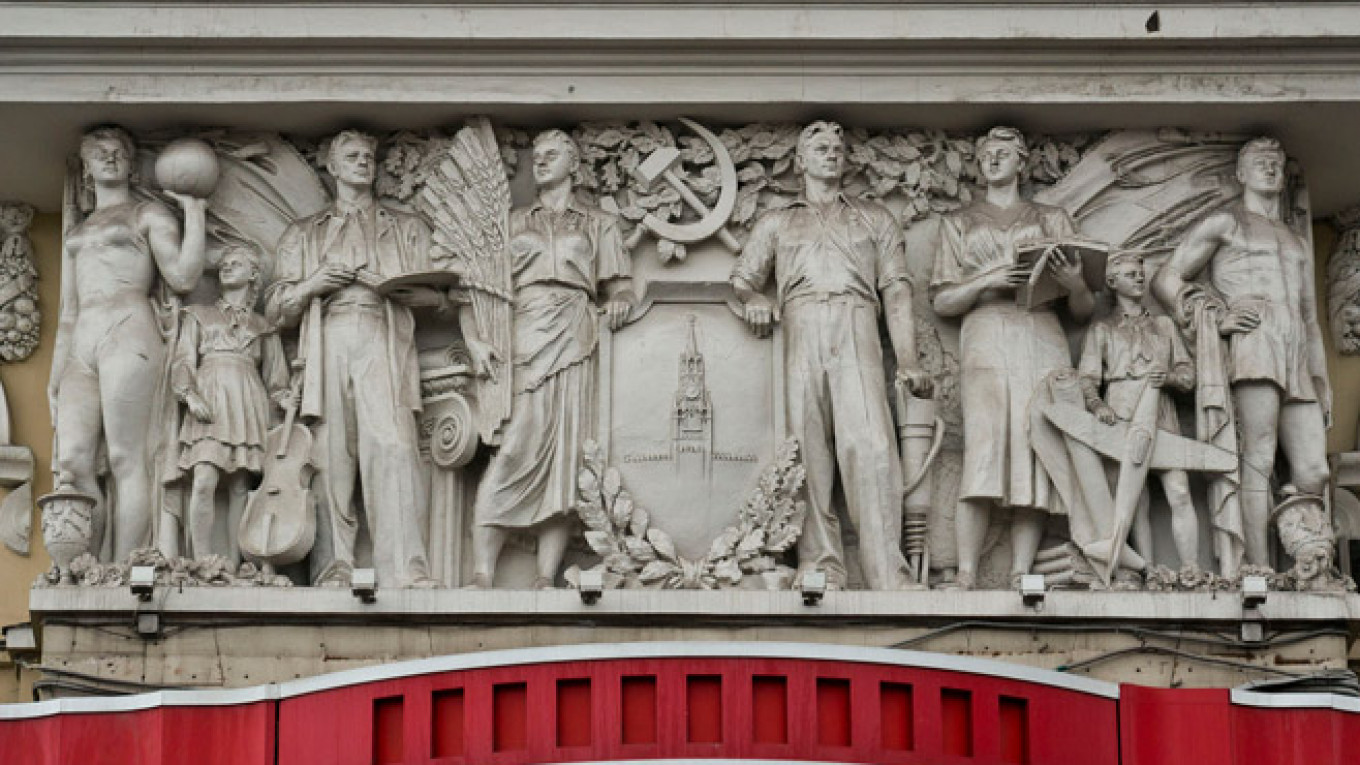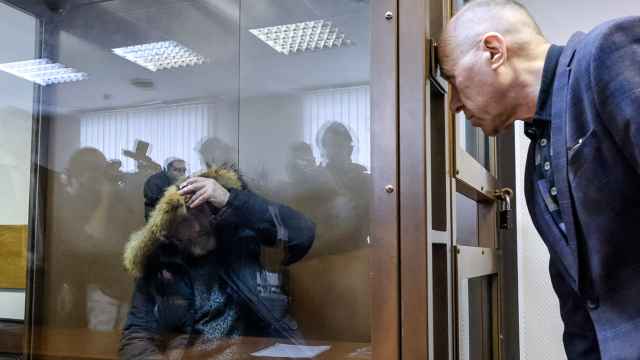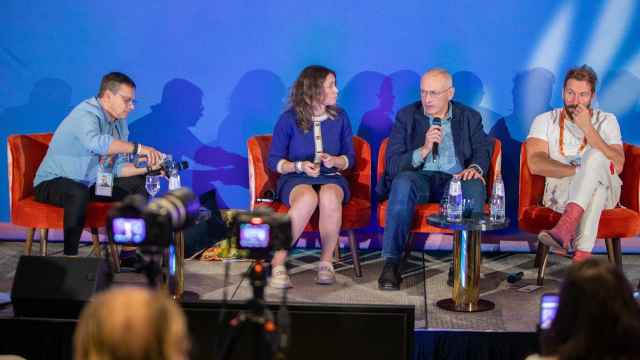Even as Russia moves to reinforce its Soviet legacy, the efforts of other former Soviet republics to rid themselves of their Communist past — including Ukraine's new de-communization legislation that comes into force Thursday — attest to natural state-building processes that have been exacerbated by the current political crisis, political analysts told The Moscow Times.
Soviet-era statues of Bolshevik revolutionary Vladimir Lenin have been toppled or vandalized throughout Ukraine in recent months in an apparent effort to negate that country's historical ties to Russia, which it has accused of fueling strife and supporting warfare in the east of the country. Since the start of the crisis in early 2014, more than 300 monuments to Lenin and 70 statues of other Soviet figures have been demolished throughout the country, according to a report by Russia's Izvestia newspaper Wednesday.
Russian political analysts view former Soviet republics' efforts to distance themselves from their Communist history — and the accompanying political repression — as a necessary process to construct or retrieve a national identity that was stifled by overarching Soviet ideology. But the form, pace and intensity with which a former Soviet state parts — or reconnects — with the dark episodes of its past is intrinsically tied to its current political circumstances, they said.
A New Ukraine
Ukrainian President Petro Poroshenko signed four laws last week that criminalize the public denial of the atrocities committed by the Soviet and Nazi regimes, and outlaw Soviet-era symbols, except for certain educational and scientific purposes. The new legislation also prohibits Nazi symbolism, opens up the secret service archives from the Soviet era and forbids the denial of Ukrainian nationalists' fight for independence during World War II. These nationalists, some of whom collaborated with the Nazis, were stigmatized during the Soviet era.
Soviet emblems will be removed from buildings, and streets and even cities bearing the names of Soviet-era figures will be changed, a process that will cost some 5 billion hryvnas ($240 million) during the next six months, according to Oleksandr Klymenko, Ukraine's former minister of revenue and duties, who criticized the move.
Individuals found guilty of violating the ban on Communist and Nazi symbols will face up to five years behind bars. Organizations, including media outlets, can be shut down or face criminal charges that carry up to 10 years in prison.
The law has attracted wide-ranging criticism. The OSCE representative for media freedom, Dunja Mijatovic, warned in a statement Monday that the new legislation, which she said was formulated in "broadly and vaguely defined language," could "easily lead to suppression of political, provocative and critical speech, especially in the media." Russian analysts have speculated the move could further alienate the factions of an already divided Ukrainian population.
Political Catalyst
The issue of de-communization had not been high on the Ukrainian political agenda before the outbreak of the current political and international crisis in 2014.
Ukraine's conflict with Russia over the latter's annexation of Crimea last March and its alleged support for pro-Russian rebels in eastern Ukraine has precipitated a process that took place much earlier in other former Soviet republics, according to Alexei Makarkin, deputy director at the Moscow-based Center for Political Technologies think thank.
"In recent decades, Ukrainian authorities, for the most part, had been on board with Russia and its shared history with Ukraine," he said. "But now that Ukraine has essentially lost Crimea and a chunk of the east, it is easier to begin. [De-communization] unites those who blame Russia for the crisis. It would have been more difficult to support prior to these major changes in the country's political landscape."
Bucking the Trend
While statues of Lenin were toppled or quietly dismantled throughout most of the former Soviet Union, Russia has strongly advocated for the preservation of its Communist heritage. In Russia, as in other Soviet republics, the names of some metro stations, streets and cities were changed after the collapse of the Soviet Union. But as its ideological grip over the former republics seems to dwindle in the fallout over the Ukraine crisis, efforts to preserve and even glorify its controversial history seemed to have redoubled.
Russian Culture Minister Vladimir Medinsky wrote a letter to Gennady Zyuganov, the longtime head of the country's Communist Party, in which he pledged to protect Communist-era monuments. Zyuganov had appealed to the minister in an open letter over the destruction of Lenin monuments in Ukraine, which he said demonstrated confusion between anti-Soviet sentiment and Russophobia.
"Our position is that evidence of the Soviet era should be preserved to remind us of the power of the human spirit, the military heroism and labor of our predecessors," Medinsky's letter read, Izvestia reported Wednesday.
"This is the only way we can achieve the historical and cultural continuity necessary for the future of Russia. Lenin statues are certainly a part of our historical identity and the Culture Ministry will do everything in its power to preserve them."
There are still some 6,000 statues of Lenin throughout Russia, according to Izvestia.
Avoiding the Present
Efforts to eradicate or glorify historical periods for political purposes are merely an attempt to compensate for leaders' inabilities to address pressing social and economic issues, said Viktor Mironenko, head of the Ukrainian Studies Center at the Russian Academy of Sciences' European Institute.
"The Ukraine crisis has led both Russian and Ukrainian authorities to foster a simplified form of nationalism in which there is very little room for nuance," he said.
The de-communization of other post-Soviet states, including the Baltic states — Estonia, Latvia and Lithuania — has been more abrupt than that of Ukraine. All three states have banned the public demonstration of Soviet symbols, though they continue to be proudly displayed on public holidays and at memorial events. The Baltic countries also rid their governments and security services of former members of the Communist hierarchy.
Alexander Bruter, a scholar at the Institute for Humanities and Political Studies in Moscow, claims that the Baltic states' decisive rejection of their Soviet past helped the countries be recognized in the West and eventually facilitated their accession to the European Union in 2004.
Latvian lawmakers submitted to parliament last week a bill that would outlaw the public demonstration of the St. George ribbon, a military decoration that has become a ubiquitous token of brash Russian patriotism after it was usurped by supporters of the country's annexation of Crimea last March. Since the St. George ribbon has begun to be associated with the pro-Russian rebels of eastern Ukraine, other former Soviet republics have unofficially banned the symbol, which has become synonymous with Russian territorial expansion.
Contact the author at [email protected]
A Message from The Moscow Times:
Dear readers,
We are facing unprecedented challenges. Russia's Prosecutor General's Office has designated The Moscow Times as an "undesirable" organization, criminalizing our work and putting our staff at risk of prosecution. This follows our earlier unjust labeling as a "foreign agent."
These actions are direct attempts to silence independent journalism in Russia. The authorities claim our work "discredits the decisions of the Russian leadership." We see things differently: we strive to provide accurate, unbiased reporting on Russia.
We, the journalists of The Moscow Times, refuse to be silenced. But to continue our work, we need your help.
Your support, no matter how small, makes a world of difference. If you can, please support us monthly starting from just $2. It's quick to set up, and every contribution makes a significant impact.
By supporting The Moscow Times, you're defending open, independent journalism in the face of repression. Thank you for standing with us.
Remind me later.






